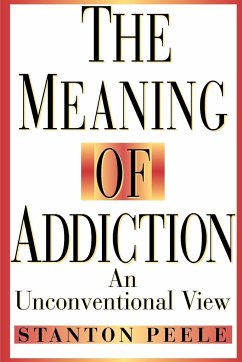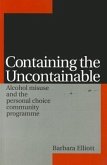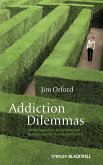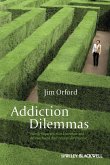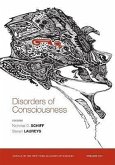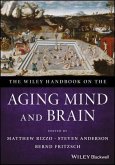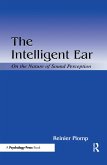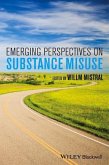The conventional idea that a substance or activity can produce a compulsion to act that is beyond the individual's self-control has dominated theory and treatment of addiction for dozens of years now. In this brilliant and original book, however, the author analyzes studies of drug and cigarette addiction, alcoholism, obesity, and other compulsions -- from running to love -- and demonstrates how doctrinaire politically correct-disease theories of addiction fail to make sense of scientific observations. Addiction, StantonPeele argues, while real, is not a biological phenomenon. Addictive behavior, like all human behavior, is best understood as adaptation -- individual, situational, and cultural variations are the rule. And the surprising frequency of self-cure is part of the amazing evidence that compulsive habits and dependency are a way of coping which individuals are able to reverse in line with changing psychological and life circumstances.
An Unconventional View of Addictive Behavior as Adaptation to the Psychological, Family, Social, and Cultural Environment "The Meaning of Addiction presented a new paradigm of addiction. The field has since become more open to the kind of complex, contextual view of addiction and compulsive behavior that it presents. Nonetheless, it remains the classic source for expressing this point of view." --Archie Brodsky, Department of Psychiatry, Harvard Medical School "Peele's theory of 'addiction as an experience' in The Meaning of Addiction remains a pathbreaking one that offers readers an accessible and empowering understanding of their own experiences, desires, and addictions. For understanding addictions, Peele is in my view (and for my courses on this subject) still the source of all sources." --Richard J. DeGrandpre, Department of Psychology, St. Michael's College, Burlington, Vermont "Stanton Peele's books have been instrumental in helping me understand my own underlying causes of addiction and how, however well-intentioned the 12-step model is, it led me to focus on the wrong aspects of addiction."--Marianne Gilliam, author, How Alcoholics Anonymous Failed Me "Offers a thought-provoking, insightful, and controversial perspective on the etiology of addictive behaviors. Peele challenges the biological model and provides an important alternative view on addictive behaviors. The Meaning of Addiction should be required reading for students and professionals alike."--Kim Fromme, Department of Psychology, University of Texas
Hinweis: Dieser Artikel kann nur an eine deutsche Lieferadresse ausgeliefert werden.
An Unconventional View of Addictive Behavior as Adaptation to the Psychological, Family, Social, and Cultural Environment "The Meaning of Addiction presented a new paradigm of addiction. The field has since become more open to the kind of complex, contextual view of addiction and compulsive behavior that it presents. Nonetheless, it remains the classic source for expressing this point of view." --Archie Brodsky, Department of Psychiatry, Harvard Medical School "Peele's theory of 'addiction as an experience' in The Meaning of Addiction remains a pathbreaking one that offers readers an accessible and empowering understanding of their own experiences, desires, and addictions. For understanding addictions, Peele is in my view (and for my courses on this subject) still the source of all sources." --Richard J. DeGrandpre, Department of Psychology, St. Michael's College, Burlington, Vermont "Stanton Peele's books have been instrumental in helping me understand my own underlying causes of addiction and how, however well-intentioned the 12-step model is, it led me to focus on the wrong aspects of addiction."--Marianne Gilliam, author, How Alcoholics Anonymous Failed Me "Offers a thought-provoking, insightful, and controversial perspective on the etiology of addictive behaviors. Peele challenges the biological model and provides an important alternative view on addictive behaviors. The Meaning of Addiction should be required reading for students and professionals alike."--Kim Fromme, Department of Psychology, University of Texas
Hinweis: Dieser Artikel kann nur an eine deutsche Lieferadresse ausgeliefert werden.

